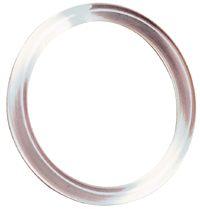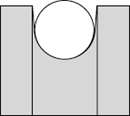
Request a Quote for Round Belts
Round Pyrathane ® belts can be manufactured
in any size from .062" through .562" in cross section. We manufacture
belts in fractional, decimal and millimeter equivalents as well
as O-ring
 size cross sections. The Pyrathane belt size is designated by
length rather than inside diameter. Our minimum length is 3-3/4"
in small cross sections. Larger cross section belts will have
somewhat longer minimum lengths (see size
chart). There is no maximum length limitation on the Pyrathane
round belt.
size cross sections. The Pyrathane belt size is designated by
length rather than inside diameter. Our minimum length is 3-3/4"
in small cross sections. Larger cross section belts will have
somewhat longer minimum lengths (see size
chart). There is no maximum length limitation on the Pyrathane
round belt.
Round cross section Pyrathane belts will run satisfactorily in either vee or round bottom pulleys. Vee bottom pulleys will, however, provide a much more positive drive than will round bottom pulleys because of the wedging action of the round polyurethane in the vee pulley. Vee bottom pulleys should be designed with approximately a 36 degree inclusive angle and should be deep enough so that the belt will not run on the bottom. Figure 1.
Round bottom pulleys may allow slippage in higher load situations which may or may not be desirable. Round bottom pulleys should be designed with a radius that matches the cross section of the belt being used. Figure 2.
We generally recommend the Pyrathane belt be run under tension (see stretch recommendations); however, some applications may run satisfactorily when just the slack is taken up (under very little tension). An example would be when running in a vee groove where the wedging effect provides the driving grip.

Figure 1 |

Figure2 |
Ambient Operating Temperature Limits Are -10 to +150 F
Pyrathane materials will operate in temperatures below -10° F.; however, if allowed to rest, they take a set which is difficult to overcome and may indeed cause fracturing upon start up.
For applications with an ambient temperature outside of the above range, Pyramid Inc. has other Pyrathane compounds which may be more suitable than those listed here.
We also have available materials that are specifically designed for outdoor use or for environments with ultraviolet light exposure or for applications where static dissipation is desirable.













